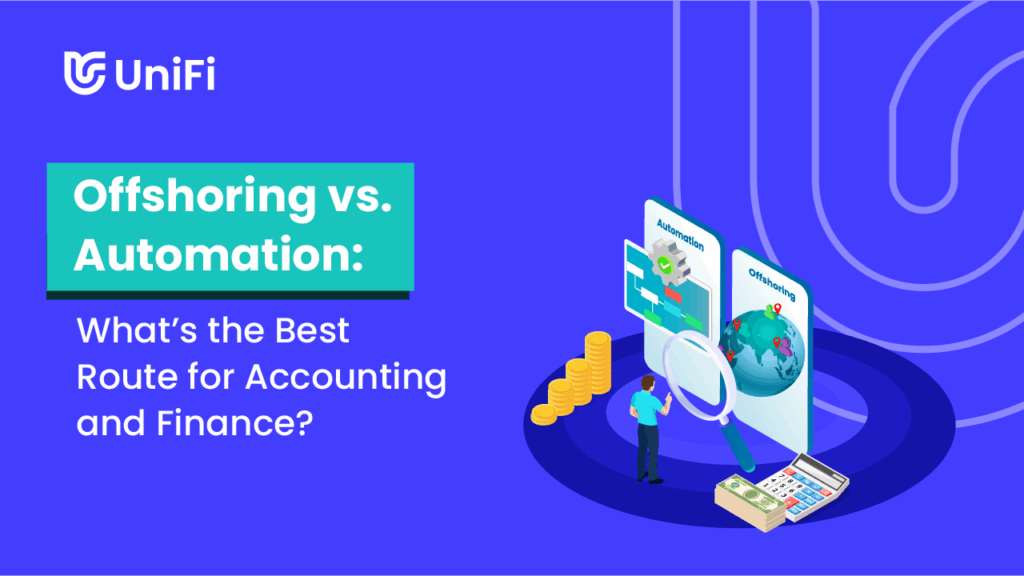As businesses strive to streamline their accounting and finance processes, two major options stand out: offshoring and automation.
Offshoring has long been used as a cost-saving strategy, moving finance tasks to teams in lower-cost countries.
However, automation is now emerging as the superior choice, offering better scalability, accuracy, and long-term cost efficiency.
In this blog, we’ll compare both approaches and explain why automation is proving to be the future for accounting and finance.
What Is Offshoring?
Offshoring involves relocating finance operations, such as payroll, bookkeeping, and financial reporting, to another country to save on labour costs.
Businesses often choose offshoring because it offers immediate access to lower wages in regions like Asia or Eastern Europe.
This can reduce operational costs without having to manage tasks internally.
But offshoring comes with several drawbacks, especially when it comes to communication, time zones, and quality control.
What Is Automation?
Automation, on the other hand, uses advanced technologies to handle repetitive, rule-based tasks without human intervention.
For finance teams, automation covers areas like invoice processing, financial reconciliations, and even compliance reporting.
Platforms like UniFi enable businesses to automate finance tasks, reducing the need for manual input and ensuring accuracy across all processes.
Automation is a scalable, efficient, and reliable solution that outperforms offshoring in many key areas.
Automation Processes in UniFi
There are two types of process automation available in UniFi: an Automation Process and an Autonomous Process.
An Automation Process assists Full, Credit, or Bot users by enhancing efficiency through features like a Calculation Engine, Process/Workflow Engine, and Accounting Automation Engine.
On the other hand, an Autonomous Process is fully managed by Bots that can perform tasks like a human, further reducing manual intervention and freeing users for strategic work.
The Drawbacks of Offshoring in Finance
1. Communication and Time Zones
Offshoring often means dealing with teams in different time zones, which can lead to delays in processing key financial data.
Communication issues due to language barriers or cultural differences can further complicate tasks, increasing the risk of mistakes.
2. Quality Control and Hidden Costs:
Offshoring teams may not fully understand the nuances of your business, leading to errors and inconsistencies in financial reporting.
Hidden costs, such as overseeing offshore teams, addressing miscommunication, and managing quality control, can quickly erode the initial cost savings.
3. Data Security Concerns
When offshoring finance operations, sensitive financial data is shared across borders.
This raises concerns about data privacy and security, which can lead to compliance issues and reputational risk.
Why Automation is the Superior Choice
1. Unmatched Accuracy
Automation dramatically reduces the risk of human error in critical finance processes.
Offshoring finance and accounting tasks still involves manual labour, leaving room for mistakes, especially in high-volume transactions.
For example, with UniFi, the automation of accounting postings directly into the finance system without manual intervention is a game-changer, as no other solution on the market provides such comprehensive automation.
This unique capability saves time, reduces the need for human oversight, and provides peace of mind, knowing that your financial data is always accurate and up to date.
2. Scalability Without Additional Staff
As businesses grow, scaling finance operations with offshored teams requires hiring more staff, training, and managing teams across different time zones.
In contrast, automation scales effortlessly. With a platform like UniFi, your accounting and finance processes can handle increased workloads without the need to onboard additional staff or manage offshore teams.
This means your business can grow rapidly, and your financial operations will automatically scale to meet the new demands—saving on labour costs and ensuring efficiency remains high.
3. Real-Time Reporting and Insights
One of the major advantages of automation is access to real-time data.
Offshored teams often face delays due to time zone differences and manual workloads, which can slow down the availability of financial reports.
Automation, however, offers businesses instant access to real-time financial information whenever it’s needed.
UniFi’s Business Intelligence capabilities provide a unified view of all your financial data, enabling faster and more informed decision-making .
With automation, you can generate reports on demand, monitor key performance indicators (KPIs) in real time, and make data-driven decisions that keep your business competitive.
4. Long-Term Cost Efficiency
While automation may require an initial investment, it offers significant long-term savings.
Offshoring can lead to hidden costs, including management, training, and potential data security risks.
By contrast, automation eliminates the need for ongoing staff management and the associated overheads.
Over time, this results in substantial savings, as automation systems continuously improve processes and provide greater efficiency without the need for ongoing investment.
Why Automation Beats Offshoring
Offshoring may have been a popular option for businesses in the past, but the limitations—ranging from communication issues to quality control—make it less effective in the modern finance environment.
Automation offers a more reliable, scalable, and cost-effective solution for businesses that want to maintain control over their accounting processes and minimise errors.
By investing in automation, companies can future-proof their operations and gain a competitive edge.
Contact us for a free consultation or demo to see how automation can transform your finance operations.


